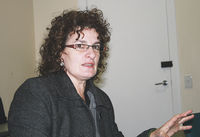Difficulties managing debt are a major cause of homelessness, including debt caused by playing pokie machines that are a big curse for people on low incomes.
 Stephanie McIntyre of Wellington’s Downtown Community Ministry which works with many of the city’s homeless people told a parish meeting in Newtown (June 2010) that DCM refuses to take grant money from the profits of gambling because they have usually come from a few people who are addicted to using the pokies. Small, low socio-economic communities are most at risk of gambling addictions – a recent survey shows the impoverished North Island forestry town of Kawerau has the greatest number of pokie machines per person.
Stephanie McIntyre of Wellington’s Downtown Community Ministry which works with many of the city’s homeless people told a parish meeting in Newtown (June 2010) that DCM refuses to take grant money from the profits of gambling because they have usually come from a few people who are addicted to using the pokies. Small, low socio-economic communities are most at risk of gambling addictions – a recent survey shows the impoverished North Island forestry town of Kawerau has the greatest number of pokie machines per person.
Ms McIntyre said that in six years as director of DCM she has met only two people who chose to sleep rough for any significant period of time, and both have had issues with mental health.
‘It’s not good for anyone to be rough sleeping.’
DCM tracks the number of people who come to their agency seeking assistance because they are homeless, or at risk of homelessness, in Wellington. Ms McIntyre says of the 96 counted in the latest three-month period, 20 are women. Only a very small handful were actually rough sleeping.
In a series of meetings convened by the parish’s social justice group, St Anne’s has been addressing the issue of homeless women sleeping behind the church.
A meeting in May endorsed lay pastoral leader Karen Holland’s practice of inviting any rough sleepers she finds to have a cuppa and a meal in the presbytery then to move on before the children arrive for school.
The meeting also agreed on the need to educate the parish community about the causes of homelessness.
‘I think it’s fair enough to ask someone to leave, to tell them that this is not an appropriate place to be living,’ Ms McIntyre told the meeting.
‘You have a right to say how this land is used for the benefit of the people in the community.’
She said DCM worked closely with the city council and Housing New Zealand to house people who are homeless.
They use a ‘housing first’ approach working to help people into the best possible housing. DCM asked homeless people (actually this was five years ago!) what their aspirations were in terms of housing and the results were ‘much the same as they would be for you and me’.
‘A house offers a pathway into the social inclusion all people need. We found they wanted a home, not just a house, some really wanted a garden. Many were quite detailed in their hopes.
‘Once in a home, people often look younger, they are well, they can walk upright.’
But Ms McIntyre said DCM sometimes had to be tough with people to ensure they paid their rent.
The social workers spend a great deal of time following up with people, building up a rapport with them so that they could then help them into housing, or help to hang onto a tenancy.
‘Debt is the biggest driver of homelessness but we can nearly always salvage a tenancy if debt is the issue.’
The important thing was to address and prevent homelessness and to treat people with dignity.
‘We have to realise that homeless people can have multiple issues including drug and alcohol dependency and mental health issues. But I would be driven to drinking too if I had nowhere to sleep, or if someone came and told me at the night shelter at 7.30 in the morning “come on, it’s time to go out now” and I had to be out all day.’
Ms McIntyre has been campaigning for a wet home where people with alcohol dependency can live but she says a small group in Island Bay opposed the siting of a wet home there, claiming the potential risks for the community’s children .
‘There is no evidence to show that homeless people are the perpetrators of sexual abuse or violence towards children. Ironically, after years of alcohol consumption people tend to have reduced sex drive and they simply don’t have what it takes,’ she said.
Other countries are much more open to housing people with complex and high needs.